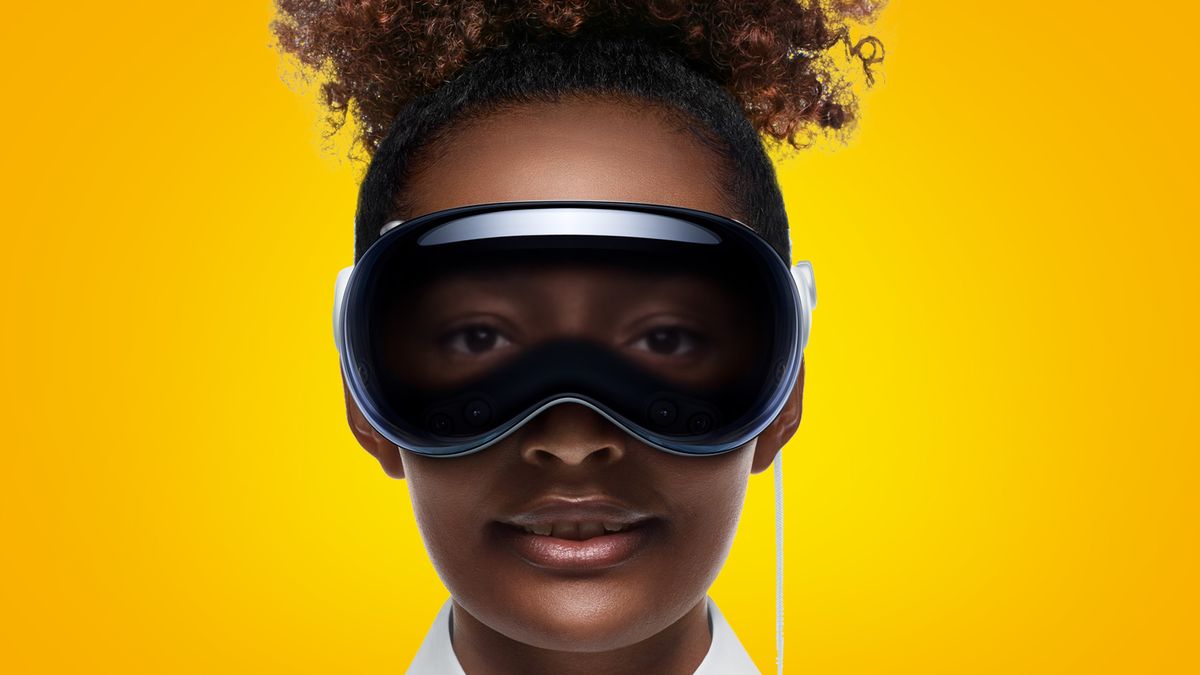[ad_1]
For weeks now, I’ve been asking friends, relatives, and many strangers if they’ll buy an Apple Vision Pro mixed reality headset. The answers have ranged from an enthusiastic “Yes!” to an adamant “No”, with more than a few people having no idea what I’m talking about.
The decision as to whether or not to buy Apple’s first mixed-reality headset, and experience Apple’s first new product category in over a decade, is more than a spur-of-the-moment one. There are considerations to be made, many of which I’ve been spinning in my own brain (while my brain wonders if it wants itself anywhere near this thing).
As I see it, it boils down to a handful of pros and cons. Let’s start with all the reasons you should buy the Vision Pro.
Reasons to buy the Apple Vision Pro
A new way to compute
Apple is wonderful at coining phrases for things that already existed but were never branded. That started back with the iMac, when ’i’ was really about the internet, and there were already millions of internet-ready computers. Apple carried on for so long with ’i’ (iPod, iPhone, iCloud – redundant, no?) that it’s a wonder the Vision Pro isn’t called ’iVision’. My point is, though, that ’Spatial Computing’ doesn’t really mean anything; it’s just better branding than ’Mixed Reality with some VR thrown in’.
That said, Apple makes a compelling case for a fungible device that’s as adept at immersing you in a game as it is in helping you construct and analyze a work project. The branding helps clarify the Vision Pro’s mission and, to be honest, belongs in the plus column.
The new new

It isn’t often that Apple steps into a new category, and if you’ve grown tired of waiting for Apple to release an Apple television set or build you an Apple car (never gonna happen), this may be your best opportunity to get in on the ground floor with one of Apple’s truly rare new ideas.
As usual, though, Apple is not inventing a category. Virtual reality has been around for decades, with Meta, HTC, and others having established a relatively successful beachhead in consumer-grade VR. Even mixed reality is not new, and while Microsoft has given up on it, Apple and many others believe that augmented reality is the true future of altered-reality hardware.
Computing through intuition

Having used most of the major VR headsets, I can attest to their power and formidable immersion capabilities. They are not, though, all that intuitive. Most require controllers, or learning some new navigation metaphor. The interfaces can be difficult to navigate. The Apple Vision Pro is none of these things. The near-perfect eye and hand tracking for gesture control is transformative; in my experience, I rarely lifted my hand from my lap to select something. It can make almost every part of ’Spatial Computing’ easier and more intuitive. If you want to see what the future of computing looks like, you might want to own a Vision Pro.
You’ll make new friends

Tell someone you own an Apple Vision Pro, and they will have a million questions. While the initial production run of the headset may have sold out, reports indicate that Apple didn’t make that many, which means few people will own a set (I’m sure Apple will produce more Vision Pros, though it’s yet to confirm this).
To be one of those rare people will feel, well, special, and people might treat you that way (or as a crazy person for spending thousands of dollars on an unproven product). Imagine wearing the Vision Pro on an airplane (using Travel Mode, of course). You probably won’t get through one Disney + 3D movie because you’ll be too busy answering questions from everyone else on the airplane.
Heart-tugging spatial imagery

I can rarely claim that you’ve never experienced a home movie like this, but it’s a fact with the Vision Pro.
Apple’s 3D spatial video system, which will show you 3D video that you captured on your iPhone 15 Pro and content you can capture through the headset (there’s a dedicated button), is more than an overpriced View-Master. The experience of watching a 3D video you shot, in which loved ones take on volume and depth, and feel exponentially more present than they do in a flat photograph or video, is hard to quantify. It will stir emotions. As an experience that may be hard to replicate on other headsets with lower visual quality, this belongs in the ’buy’ column.
An unmatched AR experience

If you’re itching to enter the world of mixed reality and VR, there may be no better option than the Vision Pro. Its dual 4K microLED displays provide 23 million pixels of high-resolution imagery that beat even the Meta Quest 3’s 2064 x 2208 per-eye visuals. Plus, while the Meta Quest 3 and Quest Pro provide decent pass-through and AR imagery, it still pales in comparison to what I experienced with the Vision Pro’s fully adjustable pass-through. I’ve used the digital crown to go from full immersion to complete AR integration with the real world; there’s never been anything quite like it in the VR or mixed-reality space, and it may be the apex AR/VR experience for those wishing to dive in.
The return of theater experience

Since 2020 and the onset of pandemic lockdowns, I’ve been to a movie theater two or three times. I miss it. With the Vision Pro, you can get the movie theater experience without ever leaving your home (or even your favorite comfy couch). Wearing the Vision Pro, I’ve viewed movie content while virtually sitting inside an ornate theater and a Star Wars landspeeder. There’s no popcorn (sad) or sticky floors (happy). I’m not sure I’d want to eat while wearing a Vision Pro, but the experience is real enough to give me theater-nostalgia vibes.
So much app potential

Even though Apple is promising a million apps available on the Vision Pro at launch, most of them will not be written specifically for visionOS or ‘Spatial Computing’. That’s okay. Think back to the situation with the first iPhone. There wasn’t even an App Store. That changed in short order, and today we have two million iPhone app options.
The same is possible with the Vision Pro, and once you see what it’s capable of with the handful of native Vision Pro apps that exist, you’ll be itching for more. This is consumer hardware with almost unlimited potential. That’s a positive in my book.
Reasons not to buy the Apple Vision Pro
High price

At $3,499 (around £2,750 or AU$5,300) for the base model, the Apple Vision Pro is so expensive that you could still end up paying almost $300 a month on an installment plan to own one. It’s such a high price that I’ve found some people immediately dismiss the idea of buying the headset, but Apple appears to be operating in some alternate universe where high inflation rates and a cost-of-living crisis have not been draining everyone’s wallets.
To be fair, Apple started working on the Vision Pro long before our latest economic turmoil – and it also knows that some people will pay almost anything for Apple magic. Still, this is way more than just a considered purchase; it’s an investment. Worse yet, glasses wearers will pay more for those Zeiss inserts ($99-to-$149), and you’ll also pay more if you want more than 256GB of storage. As far as I’m concerned, the price is one of the most significant barriers to buying a Vision Pro.
Comfort

There’s no getting around the fact that when you wear the Apple Vision Pro, you’re putting a 1.3lb / 0.6kg device on your head. Apple’s Dual Loop band, which is included in the box, is the most comfortable fit option, but wearing the Vision Pro will never be like wearing a pair of glasses. The weight will be felt on some part of your head, and it might not be as comfortable as you’d wish. If the heaviest item you ever want to put on your head is a baseball cap, the Vision Pro might be too much for you.
Feeling cut off

Apple often touts all the ways you can enjoy content in the Vision Pro: viewing panoramic photos, spatial photos and videos, and streaming movies; but it doesn’t talk much about how most of your activities will be alone. There’s no point in watching a movie through your Vision Pro while you’re sitting next to your family, is there?
You could conceivably spend all day in Vision Pro’s spatial computing world, going from consuming the morning news, to work and email, to big 3D projects, and entertainment at night (it will work while the battery is connected to a wall plug). That’s also a lot of alone time. Maybe too much.
Uncanny communication

Okay, you don’t want to be cut off from those around you – and Apple has a solution for that too. EyeSight can show your eyes to the person next to you. It even works automatically, although in my experience it looks a little weird. That’s probably because the eyes that someone else sees in the Vision Pro are not a direct view of your real eyes, but a recreation based on what the Vision Pro’s internal cameras see.
You can also have FaceTime calls with other people wearing your Vision Pro, but then you end up talking to a Persona (a 3D avatar) that looks almost exactly like the person on the other end of your call, but not completely – the Vision Pro’s uncanny valley effect may be another reason to say no.
Not enough native software
The number of native apps will be small at launch, and key ones, like Netflix, will be notably absent. Will you have the patience to wait for developers and partners to catch up?
That battery

If you wanted a truly all-in-one VR or mixed reality headset, the Apple Vision Pro’s external battery and USB-C cable might disappoint you. It didn’t bother me in my four experiences with the Vision Pro, but considering there are cheaper options that put the battery on your head, you may put that battery in the ‘don’t buy’ column.
In the end, I’m sure you’ll keep your own counsel when it comes to whether or not to buy a Vision Pro. I imagine it’s like the angel on one shoulder telling us to make smart choices, while the devil on the other is saying, “Buy that sucker now.” Or perhaps their roles are reversed, and the devil is telling you that you don’t need to wear the future, while the angel is insisting that it’s time for you to start exploring Spatial Computing. Which one are you going to listen to?
@techradar
♬ Real MR – mosey riles
You might also like
[ad_2]
–
VIPS
–
PortableAPPs
–
Funny Clips
–
Softwares
–
Videos
–
APPS
–
GAMERS
–
Book



